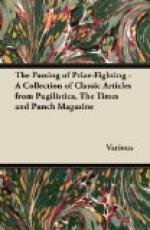* * * * *
[Illustration: THE SUPER-HUMAN DOG.
WHEN YOU CAME HOME ON LEAVE YOUR DOG, UNLIKE SOME
HUMANS, NEVER EXPRESSED SURPRISE AT SEEING YOU STILL
IN ENGLAND.
NEVER INDULGED IN DEMOBILISATION TALK.
OR HANDED OUT “CHESTNUTS.”
OR INTRODUCED YOU TO YOUR C.O. (ALSO ON PASS).
OR BORED YOU WITH HIS OWN DOMESTIC TROUBLES ("LEFT
A BOOT-JACK IN
MY DRINKING-TROUGH, SHE DID").
OR INTRUDED HIS PRESENCE AT INOPPORTUNE MOMENTS.
BUT SIMPLY WELCOMED YOU—
—IN HIS OWN—
—INIMITABLE MANNER.]
* * * * *
A SOUTH SEA BUBBLE.
“I want you,” said my hostess, “to take in Mrs. Blank. She is charming. All through the War she has been with her husband in the South Seas. London is a new place to her.”
Mrs. Blank did not look too promising. She was pretty in her way—“elegant” an American would have called her—but she lacked animation. However, the South Seas...! Anyone fresh from the Pacific must have enough to tell to see soup, fish and entree safely through.
I began by remarking that she must find London a very complete change after the sun and placidity that she had come from.
“It’s certainly noisier,” she said; “but we had our share of rain.”
“I thought it was always fine there,” I remarked; but she laughed a denial and relapsed into silence.
She was one of those women who don’t take soup, and this made the economy of her utterances the more unfair.
Racking my brain for a new start I fell back on those useful fellows, the authors. Presuming that anyone who had lived in that fascinating region—the promised land (if land is the word) of so many of us who are weary of English climatic treacheries—would be familiar with the literature of it. I went boldly to work.
“The first book about the South Seas that I ever read,” I said, “was BALLANTYNE’S Coral Island.”
“Indeed!” she replied.
I asked her if she too had not been brought up on BALLANTYNE, and she said no. She did not even know his name.
“He wrote for boys,” I explained rather lamely.
“I read poetry chiefly as a girl,” she said.
“But surely you know STEVENSON’S Island Nights’ Entertainment?” I said.
No, she did not. Was it nice?
“It’s extraordinary,” I said. “It gives you more of the atmosphere of the South Seas than any other work. And Louis BECKE—you must have read him?” I continued.
No, she had not. She read very little. The last book she had read was on spiritualism.
“Not even CONRAD?” I pursued. “No one has so described the calms and storms of the Pacific.”
No, she remembered no story called Conrad.
I was about to explain that CONRAD was the writer, not the written; but it seemed a waste of words, and we fell into a stillness broken only by the sound of knife and fork.




